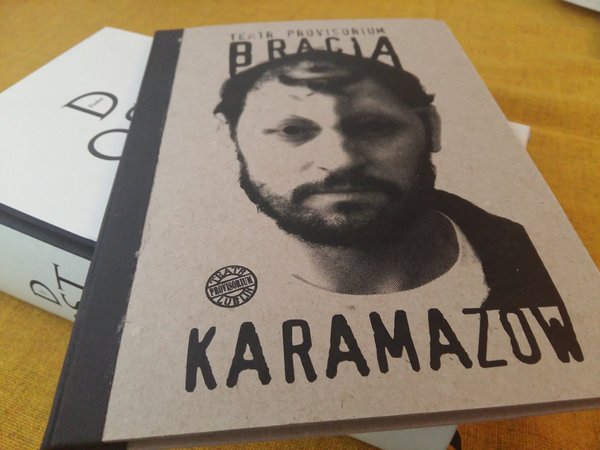 I am constantly asking my students (and myself) to reflect on the literature they, and I, read. As I have grown older—and not necessarily wiser—I find myself only reading literature that I am sure will prod me out of my intellectual and emotional torpor, like a lizard basking in the newfound warmth of spring. Right now it happens to be The Brothers Karamazov, a book I first read as an eighteen-year-old literary newbie. It might have been the first time I didn’t turn away from a book because of the daunting length of the text and the panoramic sweep of life it covers. It is now a completely new experience, though it still resonates with the young and restless soul that even now permeates the fibres and sinews of my aging and ageless self. That book made me think.—and forced me to think beyond and into my myopic experience of life thus far.
I am constantly asking my students (and myself) to reflect on the literature they, and I, read. As I have grown older—and not necessarily wiser—I find myself only reading literature that I am sure will prod me out of my intellectual and emotional torpor, like a lizard basking in the newfound warmth of spring. Right now it happens to be The Brothers Karamazov, a book I first read as an eighteen-year-old literary newbie. It might have been the first time I didn’t turn away from a book because of the daunting length of the text and the panoramic sweep of life it covers. It is now a completely new experience, though it still resonates with the young and restless soul that even now permeates the fibres and sinews of my aging and ageless self. That book made me think.—and forced me to think beyond and into my myopic experience of life thus far.
In short, I could not read without responding. The reflections of my mind needed an outlet, so I found myself arguing and assenting long rambles in notebook journals or with anyone who would listen to me, argue with me and explore with me. In that way the novel became—and still is— a part of me. The more I wrote about what I read the more I knew the book. By knowing what I knew (and did not know). I realized that only by exploring through reflection could I answer through an essay.
Most of us have to write essays about subjects we know precious little about; hence, our essays have the taint of soured milk—still milk, but hardly worth drinking…
Our teachers mark us down for inserting the I voice into our writing as if “we” don’t really exist—as if there must always be proof beyond ourselves that “knows” more than we know—as if that is something we don’t already intrinsically know. To me, a good essay reeks of what we know, what we have explored and what we are seeking to know, and it is a damn pity when a teacher robs us any part of that triad.
You are only wrong when your facts are wrong, distorted by prejudice or bigotry, or so steep in self-indulgent arrogance that your words fail to resonate with any kind of lasting ring—like a drum without a skin or a harp without a string.
You are equally wrong when you simply spin words into a song without music, words without meaning and foundation in your own heart—without the essence of the real and palpable you to speak with a clarity that helps others to see and feel and experience “your” experience.
A reflection is simply your recreation of your inner experience of experience. In reflecting we see our warts and blemishes clearly until those imperfections are diminished by the truth and sincerity of our search for meaning and substance to give voice to that search—and that search should extend beyond yourself. No doubt if you wondered something, someone else wondered the same thing, and maybe even wrote about it.
Keep exploring until your inkwell is dry and your head is emptied.
And only then should you write your essay…

I loved those last two lines!!! Hate to break it to you though, we don’t use inkwells anymore.
A very inspirational. Thank you so much for sharing Fitz!
the last line you wrote were the best thing I’ve heard all day! No essays for a long time!! Woohoo
Or at least two weeks:)
Yes, it sounds like a good book, and a good exercise. I need to finish All Quiet on the Western Front first..
I hate when teachers mark us down for using the I voice. Thanks Fitz.
Like Ahbi I hate when teachers do that. I also loved the last 2 lines I just need to finsih chapter 7 first!
I love using the I voice, so this is relieving! Also, I agree with you that we should reflect on our feelings before we start to write an essay. To that point, writing a short metacognition on a book that is just starting get interesting is much easier than writing an essay… Thanks Fitz!
Being totally honest here, I think that your paragraph about the I voice should be among the inspirational quotes that are or were hanging around the school… I found that section of this piece to be very compelling, and it struck me in a way that the rest of it did not. Do not get me wrong, I greatly enjoyed the whole thing… This milk was certainly fresh if you catch my meaning.
If someone doesn’t use the paragraph about the “I” voice as a yearbook quote, I will be shocked. I really enjoyed reading this piece.
I can really relate to a lot of what you said. Good stuff.
YAY ANOTHER ESSAY!! (Sarcasm) good thing it’s in a little while.
Really the last line is poetry
I meant “I really like the last line. True poetry.”
Wow I definitely agree with this entire essay, you’re saying what I’ve been complaining about for a while.
I completely agree. I can tell when a reflection is forced and not a real reflection. Both when I’m writing and reading.
Really love this especially the last couple lives. This is 100% true.
I love the last two lines. I also thought that it was completely true. I will try to prove my self more into think better.
This was an interesting essay and I agree that “a good essay reeks of what you know” because I and most people as well, wright better about what we know.
Fitz, I’ve been looking everywhere but I can’t find my inkwell! 🙂
Very cool post, and you really showed your feelings about how you felt. My inkwell is not dry yet so I guess no essays for me.
Doesn’t sound like there is a lot of enthusiasm for an essay 🙂
Wow, I completely forgot to comment, I did read it though. I still really don’t understand why some teachers don’t allow us to use the I voice
I was enthusiastic about this blog post
This was a fantastic post, I really questioned the way I write my essays, reflections, and even just random blog posts. I especially liked that last line, it really sends a message. I also believe in using the “I” voice in essays, I don’t understand why teachers don’t let us use it as much.
As I’m sure most people said, I ALSO BELIEVE WE SHOULD BE ABLE TO USE THE I VOICE MORE!!! The post was really compelling and made me think about how I write everything, even just the DayOne reflections.
As reflections on reflecting go, this one was inspiring. And not just because I got bumped down a grade on an essay last year for using the I voice. I have found that my biggest problem in writing longer analyses is having too many unorganized, partially explored thoughts. When I have a large pool of ideas and themes explored in reflections, making an essay is more about the artistic flow and style of editing, rather than a scramble for a cohesive whole.